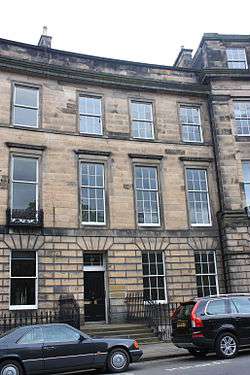John Hay Forbes, Lord Medwyn

John Hay Forbes, Lord Medwyn (19 September 1776 – 25 July 1854) was a Scottish judge.
Life
Forbes was born in Edinburgh on 19 September 1776[1] the second son of Sir William Forbes, 6th Baronet, and his wife Elizabeth Hay.
He studied Law at Edinburgh University and was admitted to the Scottish Bar as an advocate in 1799. He was for some time Sheriff Depute of Perthshire, and was made Lord of Session in January 1825, when he assumed the courtesy title of Lord Medwyn, from his estate in Perthshire.
In the 1830s he is listed as living at 17 Ainslie Place on the Moray Estate in the west end of Edinburgh.[2]
In December 1830 he was made a Lord of Justiciary. He resigned that appointment in May 1849, retired from the bench in October 1852, and died in Edinburgh, 25 July 1854.[3]
He was a committed Episcopalian.
Works
He edited a new edition of ‘Thoughts concerning Man's Condition and Duties in this Life, and his Hopes in the World to come’, by Alexander Forbes, 4th Lord Forbes of Pitsligo (1678–1762), 1835, 4th ed. Edinburgh, 1854.
Family
Forbes married Louisa Cumming-Gordon, daughter of Sir Alexander Cumming-Gordon of Altyre, Elgin. They had several children, including the sons William Forbes of Medwyn, Alexander Penrose Forbes (who became bishop of Brechin) and George Hay Forbes, Episcopalian clergyman and founder of the Pitsligo Press. Their daughter were Louisa Penuel Forbes and Helen Forbes.[4]
Artistic Recognition
Forbes' portrait is held in the University of St Andrews.[5]
References
- ↑ http://www.geni.com/people/John-Hay-Forbes-Lord-Medwyn/6000000002115859858
- ↑ Edinburgh and Leith Post Office directory 1832-3
- ↑ http://thepeerage.com/p4.htm
- ↑ http://www.geni.com/people/John-Hay-Forbes-Lord-Medwyn/6000000002115859858
- ↑ http://www.bbc.co.uk/arts/yourpaintings/paintings/john-hay-forbes-17761854-lord-medwyn-125648
![]() This article incorporates text from a publication now in the public domain: "Forbes, John Hay". Dictionary of National Biography. London: Smith, Elder & Co. 1885–1900.
This article incorporates text from a publication now in the public domain: "Forbes, John Hay". Dictionary of National Biography. London: Smith, Elder & Co. 1885–1900.